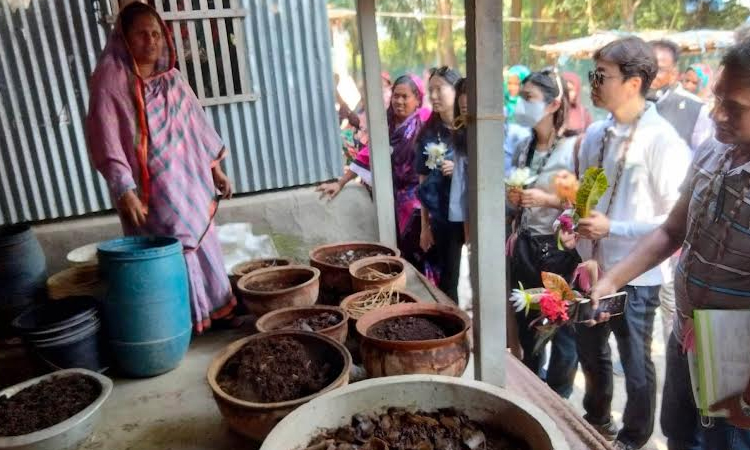News Flash

By S M Zahid Hossain
KHULNA, Oct 17, 2025 (BSS) - In a quiet corner of Joynagar village under Dacope upazila in Khulna, a tin-roofed shed in the backyard of Roushan Ara Begum's house hums quietly with life.
Inside, hundreds of earthworms work tirelessly beneath damp soil, transforming organic waste into nutrient-rich vermicompost - an organic fertilizer that is not only changing her life, but also uplifting the livelihoods of others in her community.
A decade ago, Roushan Ara, 38, wife of Md Mamun Morol, never imagined that earthworms could become the foundation of her family's financial stability. Today, she is a successful entrepreneur, earning between Taka 8,000 and 10,000 per month by selling compost and earthworms.
What began as a small-scale initiative with a modest investment has evolved into a thriving business - symbolizing empowerment, sustainability and resilience.
"My backyard now has two large concrete composting houses, a dozen earthen pots, and about 150 ring slabs," she told BSS while sharing her story on Wednesday. "Each is filled with decomposing organic matter, mainly cow dung, banana stems, and water hyacinths, which we process into high-quality vermicompost."
Roushan Ara explained that imported red earthworms are mixed with rotten banana and cow dung and left to decompose for several hours. The resulting mixture is then converted into compost that is safe for health and environmentally friendly.
"Each pot can hold 15 to 20 kilograms of compost, while my larger houses can store up to five maunds," she added proudly.
Her journey began in 2009 when she received training from the local non-governmental organization (NGO) Ullashi Srijoni Songho. She later attended specialized training courses organized by the Department of Agricultural Extension (DAE) and another NGO, Jagroto Jubo Sangha (JJS).
"At first, it was hard," she recalled. "People laughed when I said I was farming worms. But I didn't give up. Now they come to learn from me."
With support from NGOs, she started her vermicompost production on a small scale in 2011. Through dedication and hard work, her venture has grown steadily. At present, she sells each kilogram of compost for Taka 25 in retail and Taka 20 in wholesale markets. A kilogram of earthworms is sold for up to Taka 1,800.
"Currently, I have compost worth around Taka one lakh in stock," she said.
Roushan Ara's initiative is also creating environmental awareness. Farmers in Khulna are increasingly turning to organic alternatives as chemical fertilizers become more expensive and less effective.
"Massive response from farmers, especially women, encouraged us to expand compost production and promote organic vegetable cultivation," said Md Monirul Haque, Director of Ullashi Srijoni Songho. "We imported red earthworms and began distributing them among trained farmers across Khulna's upazilas. Today, earthworm compost is available at fair prices across the region."
Naryan Mondal, a local farmer, said, "I have become self-reliant through selling and using this compost. It helps produce fresh, chemical-free vegetables that are also tastier."
Echoing the sentiment, Kamal Gazi, another farmer, said, "I used Roushan Ara's compost on my vegetable fields. The yield was better, and the soil feels healthier. It's affordable and pure."
Beyond production, Roushan Ara also trains others - mainly women and farmers - under programmes conducted by NGOs such as BRAC and JJS. She earns Taka 1,500 for each one-hour session.
"Teaching others gives me real satisfaction," she smiled. "I want more women to realize that with patience and commitment, they too can succeed."
Praising her efforts, Dacope Upazila Agriculture Officer Md Shafiqul Islam said, "Vermicompost brings life back to the soil. Farmers like Roushan Ara are paving the way for sustainable and eco-friendly agriculture."
The DAE office in the upazila has also procured vermicompost produced by Roushan Ara and distributed it among farmers for use in their fields.
Speaking to BSS, Md Rafiqul Islam, Additional Director of the Department of Environment (DoE), Khulna Zone, said organic vegetables produced using earthworm compost are gaining popularity due to their environmental and health benefits.
"Farmers who previously used compost made from household or municipal waste or chemical fertilizers are now switching to earthworm compost," he said. "Such initiatives must be supported through government programmes to encourage wider adoption."
From waste to wealth and from dependency to dignity - the story of Roushan Ara Begum serves as a powerful reminder that small ideas, nurtured with hard work and perseverance, can transform not only individual lives, but entire communities.